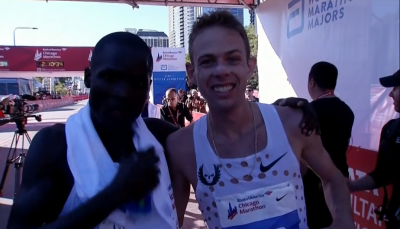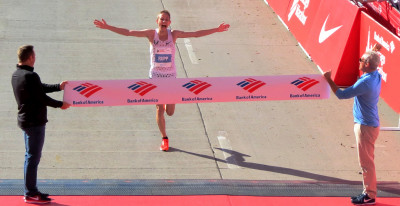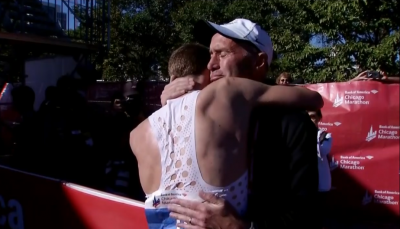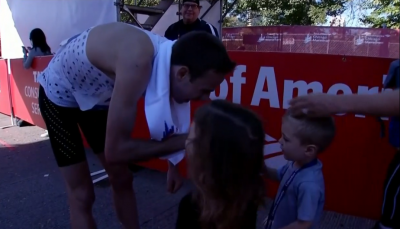American Galen Rupp Wins 2017 Chicago Marathon – 1st American-Born Winner in 35 Years
by LetsRun.com
October 8, 2017
CHICAGO – In 2016, the Chicago Cubs discarded 108 years of losing and won their first World Series title since 1908. Today in Chicago, Galen Rupp followed their lead and became the first American-born winner of the Chicago Marathon in 35 years by running a personal best of 2:09:20 to win over last year’s champ Abel Kirui of Kenya, who was second in 2:09:48.
Rupp is the first American-born winner in Chicago since Greg Meyer won in 1982 (Khalid Khannouchi won the race in 1997 and 1999 for Morocco and 2000 and 2002 for the US). He got the win by ripping off five straight sub-4:40 miles for miles 22 (4:39), 23 (4:35), 24 (4:30), 25 (4:34), and 26 (4:33) to decimate the five-man lead pack.
“It’s just incredible. You train so hard, year in and year out, day in and day out. To have a race like this where it all comes together and to be able to win in a city that really is such a special to me given that my dad grew up here,” said Rupp after the race on the local NBC telecast. “Words can’t describe the feeling of crossing the line and seeing my family, my coach. This just isn’t about me – there are so many people that are part of the Nike Oregon Project. I’ve felt like I’ve always had such great support from the Nike family, my coach Alberto Salazar, obviously my wife and kids – they’ve all sacrificed so much – it’s for all of them. It’s just a great day.
“[To win is] tremendous, I feel like I’ve been second so many times in my career and always this close. I just am so thrilled I was able to pull it out here in a city like this – the crowd support was incredible. You go through different areas and it was just booming.”
Rupp said he purposely wanted to wait until late in the race to take the lead.
“I hadn’t really planned out when I was going to go but I definitely wanted to wait until at least 20 miles – 22 miles – the longer the better. I made the mistake in the past of going a little too hard too soon and you still got a long ways to go – several miles. I really wanted to wait. I kind of just felt a little gap and at that point it’s you’ve got to put the hammer down and just drive to the finish so that was my plan.”
The Race
On a day where the conditions (56 degrees and sunny at the start, never higher than 65 during the race) were more than suitable for running fast as shown by the fast times in the women’s race, the men ran a largely tactical race until the final five miles.
The first mile was just 5:10. None of the first 14 miles were under 5:00 save for a 4:56 7th mile. As a result, American Aaron Braun (12th 2:13:41), who has a pb of 2:12:54, led much of the early race and a pack of 22 men hit halfway in 66:10-66:11.
During the 15th mile, the pace finally started to pick up and the man doing the leading was a man some speculated might have been entered in the race to set the pace for Galen Rupp, Emmanuel Bett of Kenya. With Bett in the lead, the pace went under 5:00 once again and the 4:55 15th mile halved the lead pack to 11 runners. Miles 16-17-18 were run in 4:48, 4:48, 4:54 and nine men were still in the lead pack at 30k (1:33:21 – 2:11:17 pace) including two Americans besides Rupp, Sam Chelanga and Chris Derrick. Derrick, who was doing some of the leading, would hold up the best of the two as he’d end up ninth in his debut in 2:12:50 as Chelanga faded to 15th in 2:15:02 in his first career marathon finish.
Bett would drop out shortly after 30k.
The pace then slowed once again as mile 19 was 5:04, 20 was 4:57 and 21 was 5:08. While many in the lead pack were just hanging on, Rupp was gathering himself for the push for home and he struck in the 35th km, which he covered in 2:50 – that’s 4:33.5 mile pace. Rupp was making his move for glory. Could anyone say with him?
No. Rupp didn’t relent all the way home as all of his final five miles were under 4:40. As late as 35k, Rupp was on 2:11:03 pace but he ended up with a 38-second pb and final time of 2:09:20 as he ran his final 5.2188 miles in an unofficial 24:02 – that’s 4:36.3 per mile, or 2:00:45 marathon pace.
Quick Take #1: The U.S.-born major drought is over, and that’s a big deal
Here’s the list of the last U.S. born male winners at the eight current World Marathon Majors events.
Chicago: Galen Rupp, 2017 (previously Greg Meyer, 1982)
Boston: Greg Meyer, 1983
New York: Bill Rodgers, 1979 (Alberto Salazar won in ‘82 but was born in Cuba)
Berlin: never
London: Dick Beardsley, 1981 (Beardsley was awarded a tie in 1981 – the first year of the race)
Tokyo: never
World Championships: never
Olympics: Johnny Hayes, 1908 (Frank Shorter won in ‘72 but was born in Germany) *EDIT: Note, Shorter was born a US citizen to American parents as his father was in the military and stationed in Germany. So shorter was “American born,” just not physically born in the US.
While Khalid Khannouchi and Meb Keflezighi have delivered plenty of incredible performances for the U.S., a win of this magnitude by a non-African-born American has been a long time coming, and it’s never happened during the current era of Kenyan/Ethiopian dominance. Rupp’s win wasn’t just big for the U.S.; it was big for the rest of the world, as well. It had been almost nine years since a man born outside of Africa had won a World Marathon Major (Marilson Gomes dos Santos in New York in 2008). Rupp’s win today was a breakthrough, but it remains to be seen whether he is a generational talent or if his win can open the doors for other non-Africans to contend on the sport’s biggest stages. If we had to choose right now, we’d lean toward the “generational talent” explanation.
Quick Take #2: Was This Alberto Salazar’s most enjoyable day as a coach?
Salazar has coached Olympic champions (Mo Farah, Matthew Centrowitz) and coached Galen Rupp to two Olympic medals, but in terms of personal satisfaction, it’s hard to imagine anything topping this. Salazar’s goal when the Oregon Project was established in 2001 was for American distance runners to compete with and beat the world’s best, and though Rupp has done the former for years, he had yet to earn a signature international victory. Today, he accomplished that in Chicago, and he did it in dominant fashion, running each of his final five miles in the 4:30s to cover the final ~10k (20 miles to finish) in 29:14.
While Rupp’s victory was unquestionably the headline today, Salazar had another athlete in Chicago. Jordan Hasay’s 2:20:57 puts her #2 on the all-time U.S. list, behind only Deena Kastor. Once again, Hasay blew even her optimistic expectations out of the water. Going into her debut in Boston in April, Hasay was aiming for a 2:25:00 and ran 2:23:00. Today, under “perfect conditions,” Salazar believed she could run 2:21 or 2:22.
“I told Galen,” Salazar said, “Hey, I’m glad you won today, but I’ll tell you right now, if we’ve gotta say performer of the day for the Oregon Project, I’ve gotta give it to Jordan.”
Salazar is the head coach of the Oregon Project, but right now it’s really two groups: the track group, helmed by Pete Julian (whom Salazar still consults) and the marathon group (Rupp and Hasay) helmed by Salazar. So for the marathon group, the one Salazar has invested the most time and effort in, to come out and crush it today? It doesn’t get much better for a coach.
And it clearly showed in the aftermath of the race. Salazar said that his sons often joke that Galen is Salazar’s “favorite son,” and Salazar was in tears when he and Rupp embraced in the finish area.
But of course, Salazar’s legacy is not as simple as “great coach does good.” For his fans, today was the ultimate validation of his methods, that Salazar’s win-at-all costs approach and willingness to consistently inhabit the “gray area” when it comes to the rules and ethics of the sport, is necessary in order for athletes such as Rupp and Hasay to do things Americans have never done before. For his detractors, it is another uncomfortable moment, with Rupp’s groundbreaking victory coming less than five months after a leaked USADA interim report explaining that it was “highly likely” Rupp and five other athletes violated anti-doping rules under Salazar.
Afterwards, Salazar spoke to LetsRun.com about the USADA interim report and said, “I know that we haven’t broken any rules.” We have a separate article on Salazar’s comments: Alberto Salazar Addresses Leaked USADA Interim Report That Said It Was “Highly Likely” His Group Broke Anti-Doping Rules: “I Know That We Haven’t Broken Any Rules”
Quick Take #3: Did the other contenders make a mistake by allowing the race to go slow?
Rupp and Kirui are two guys with a track record of success in championship marathons. They’re as close to “kickers” as you can get in the marathon, with the caveat that a marathon “kick” lasts can last several miles. So when the leaders hit 35k in 1:48:43 (2:11:03 pace), that was playing into their hands. Perhaps unsurprisingly, Rupp and Kirui went 1-2.
The easy criticism is to say well, the other guys should have made it faster. But in practice, that’s hard to do. Even at 2:11 pace, there were only five guys left in the race at 35k. Salazar pointed out that the reason why most of Rupp’s opponents didn’t pick it up and make any moves was simple: at the pace they were going, they couldn’t.
“A lot of times we watch races and we think, Oh, it’s foolish of these people, why are they not moving, trying harder, trying to break people? I mean, they’re educated and they’re smart. They just don’t feel good.”
Salazar’s comments are very honest. The facts are many of the top entrants did not run great. In the chart below, you will see how the seven men who entered with a PB of under 2:07 did today. 4 of them faded in the second half with two of them dropping out.
| Name | Nation | PB | Comment |
| Dennis Kimetto | Kenya | 2:02:57 | DNF. Dropped out between halfway and 25k. |
| Stanley Biwott | Kenya | 2:03:51 | Dropped out between 25k and 30k. |
| Feyisa Lilesa | Eth | 2:04:52 | Stuck with leaders for 30k, finished 14th in 2:14:49. |
| Abel Kirui | Kenya | 2:05:04 | His coach said he was 90% as fit as last year, but he battled gamely and finished 2nd. |
| Sisay Lemma | Eth | 2:05:16 | Finished 4th in 2:11:01 by running 66:11-64:50. |
| Ezekiel Chebii | Kenya | 2:06:07 | Finished 7th in 2:12:12 by going 66:11-66:01. |
| Bernard Kipyego | Kenya | 2:06:19 | Finished third in 2:10:23 thanks to a 66:11-64:12 |
Oh yeah. Some people consider Zersenay Tadese to be a 2:06 marathoner as that’s what he ran the Nike Breaking2 exhibition. We do not and for good reason. Tadese ran 2:12:19 today for 8th – the last of the eight people in the race managed to run a negative split off of a pedestrian 66:10 first half – meaning he’s never broken 2:10 in a legitimate marathon.
Quick Take #4: Galen Rupp may be a marathoner, but he still approaches racing like a track guy
When Salazar and Rupp ran through potential scenarios pre-race, one of the situations they addressed is what to do if the pace went slow. Rupp asked “When should I go?”
“Why don’t you just wait til the last quarter mile?” Salazar responded. “You wouldn’t go any sooner than that in a track race so why are you gonna do it in a [marathon]? But of course, sometimes if you let people stay in the race too long, anything can happen. So wait until the end, unless you feel really good and then if you sense weakness, throw a few little pickups in and if you see [them] start to get gapped and you sense that perhaps they’re vulnerable, [then] at that point, really go for it.”
Rupp expressed a similar sentiment after the race.
“I really wanted to wait until at least 22 miles. That was kind of a number I had in mind. But even later, if there was a big group, I was prepared to wait until even a mile to go. Because even at 22 miles, four miles is a long ways. And especially after you’ve already run 22, there’s a lot that can happen in there. The important thing, I think, was to be decisive…He wasn’t right on me when I started to move, and at that point, I told myself you’ve got to go and really put the hurt on him.”
Quick Take #5: Abel Kirui praises Galen Rupp, wants to continue training in Kaptagat
Kirui said that while his speed workouts went well during the final month of his buildup, an Achilles tendon injury meant that he couldn’t hit them hard early on in his buildup, which he felt was one of the reasons he was not able to hang with Rupp late in the race. Still, Kirui was very happy to take second and had praise for Rupp’s run.
“I think it is a great honor,” Kirui said. “It is now proof that anybody can challenge Kenyans and Ethiopians.”
Kirui, previously based in Iten, trained for this buildup in Kaptagat with Patrick Sang and Eliud Kipchoge and said that he would like to do the same for his next marathon as well.
Quick Take #6: Another podium finish for Bernard Kipyego
Kipyego has been a very consistent marathoner, as he’s finished in the top three in five WMM events (3rd 2011 Chicago, 3rd 2012 Boston, 3rd 2013 Tokyo, 2nd 2016 Tokyo, 3rd 2017 Chicago). Unfortunately, he has yet to win one (though he has won Amsterdam twice), and though he came up just short once again today, he was happy to at least finish on the podium.
“I’m happy about it but maybe one day, one time, I will do something special,” Kipyego said.
Quick Take #7: Chris Derrick went for it, and he’s hoping that pays off down the line
Derrick had tried to temper expectations going into this race, but even still, he said that after his successful buildup, it was hard not to be excited going into his marathon debut. Derrick said before the race that 2:12 would have been “okay” and 2:10 would have been “great,” and though he ran 2:12:50 today, times only go so far in describing a marathon performance. Derrick ran with the leaders through 20 miles, even taking the lead during mile 18, and though he may have been able to run slightly faster by hanging back when things started to pick up, that was not the way he wanted to race today.
“When we got to 15 miles or so and things started moving, I knew I had a choice of I could just start checking my watch and trying to run 4:57s, as many in a row, or I could go with this and compete and see what it’s like,” Derrick said. “And [coach] Jerry [Schumacher] had told me he that wanted me to race, he wanted me to be in the race and to not be afraid of anyone.
“I certainly paid the price for that, my last two miles were probably 5:30. It was pretty rough. But I think it was worth it to attack it in that way and learn for the future because it’d be nice to run a faster time, but at the same time I know this is going to be a process and a journey in the marathon and I want to give myself the experiences that give me the best chance to succeed in the future.”
Derrick said he thinks his future is in the marathon, but he’d still like to lower his 10,000 pb of 27:31 from 2012.
“I would prefer to not end my career with my 10,000 PR being from when I was 21,” Derrick said.
Moving forward in the marathon, Derrick said he will have to look into changing up his fluids. Today, he felt that his drinks were too concentrated and that he wasn’t able to stay hydrated as a result.
Quick Take #8: Sam Chelanga is still optimistic despite 2:15 debut
Chelanga ran competitively today and was with the leaders through 20 miles, but he said his legs felt tired starting at 35 kilometers and as a result he fell back quite a bit (he split 17:46 from 35k to 40k). The good news is that Chelanga did manage to finish the race — albeit in 2:15:02 — which is an improvement on his DNF from his debut at the Olympic Trials. Most athletes in Chelanga’s situation would be despondent in the moments immediately after a race like that — going in, he had wanted to run close to 2:10 — but Chelanga was remarkably upbeat and is already excited to give 26.2 miles another shot.
“The big thing I learned today is I got to learn the marathon. That’s the biggest lesson. Now I know who that guy is. When you say a marathon, I have an idea of what it is. Now I just gotta try to sweet-talk him, see if we can be friends.”
Quick Take #9: Odds and ends
World record holder Dennis Kimetto’s struggles continued today. He recorded his third DNF in his last four marathon starts and hasn’t run a good one since taking 3rd in London in 2015…2:03 man Stanley Biwott’s return from injury didn’t go much better. Today was his third straight marathon DNF (2016 Olympics, 2016 New York, 2017 Chicago) with a DNS at 2017 London sprinkled in between…Feyisa Lilesa hasn’t been the same marathoner since relocating to the U.S. In that span, he has finished 4th in Honolulu (2:15:57), 12th in London (2:14:12) and 14th today (2:14:49)…Aaron Braun was the #3 American today after Rupp and Derrick, and though he couldn’t improve upon his 2:12:54 pb, his 2:13:41 was a solid showing in his first marathon since January 2015…Other notable Americans were Andrew Bumbalough (13th, 2:14:04), Diego Estrada (16th, 2:15:19), Jonas Hampton (17th, 2:15:46), Noah Droddy (19th, 2:16:26), and Luke Puskedra (20th, 2:17:53)…Matthew Centrowitz ran the first half of the race today, though it looks like he applied for the bib under his father’s name (Matt) and age (62). How do we know it was the younger Centro? See the tweet below.
@JordanHasay celebrates with many fans post #ChicagoMarathon 2017 with her 3rd place finish! Congratulations! pic.twitter.com/OZYgF8QGqV
— Jane Monti (@JaneMonti1) October 8, 2017
For those curious about Centro’s splits, looks like he used it as a long run/workout.
Looks like @MattCentrowitz ran the first half of Chicago as a workout… pic.twitter.com/Tua1focNao
— Jonathan Gault (@jgault13) October 8, 2017
Top 30 results appear below. Talk about the race on our fan forum.
- Official 2017 Chicago Marathon Live Discussion Thread
- Rupp haters go home DEVASTATED!!!!!!!!!!!!!!!!!!!
- CONGRATULATIONS GALEN RUPP FOR WINNING YOUR FIRST MAJOR INTERNATIONAL RACE!
- Galen MF Rupp!
- CONGRATULATIONS GALEN RUPP FOR WINNING YOUR FIRST MAJOR INTERNATIONAL RACE!
- How big of an asterisk should we put next to Rupp’s win? Own pacer, only 2 guys broke 2:10, USADA investigation
- 2:09?? Was that the Chicago marathon or the Flying Pig marathon?
- Galen Rupp’s yearly salary
- VERY COOL: Rupp RACED Chicago without a watch on?
- JORDAN HASAY IS THE 2ND FASTEST MARATHONER IN AMERICAN HISTORY!!!!!
- Is Jordan Hasay NOW the most successful American female prodigy? Discus…
- Alberto Salazar at the top of the marathoning world: Galen wins Chicago, Hasay runs 2:20:57
| 2017 Chicago Results Top 30 Results1 Rupp, Galen (USA) Portland, OR 2:09:20 2 Kirui, Abel (KEN) 2:09:48 3 Kipyego, Bernard (KEN) 2:10:23 4 Lemma, Sisay (ETH) 2:11:01 5 Sambu, Stephen (KEN) 2:11:07 6 Matsumura , Kohei (JPN) 2:11:46 7 Chebii, Ezekiel (KEN) 2:12:12 8 Tadese, Zersenay (ERI) 2:12:19 9 Derrick, Chris (USA) Portland, OR 2:12:50 10 Shelley, Michael (AUS) 2:12:52 11 Miyawaki, Chihiro (JPN) 2:13:23 12 Braun, Aaron (USA) Flagstaff, AZ 2:13:41 13 Bumbalough, Andrew (USA) Portland, OR 2:14:04 14 Lilesa, Feyisa (ETH) 2:14:49 15 Chelanga, Sam (USA) Colorado Springs, CO 2:15:02 16 Estrada, Diego (USA) Flagstaff, AZ 2:15:19 17 Hampton, Jonas (USA) Medford, MA 2:15:46 18 Matsuo, Ryoichi (JPN) 2:15:50 19 Droddy, Noah (USA) Boulder, CO 2:16:26 20 Puskedra, Luke (USA) Eugene, OR 2:17:53 21 Phillips, Jonathan (USA) Brighton, MA 2:18:19 22 Peterson, Alan (USA) Chicago, IL 2:18:47 23 Yilma, Yon (USA) Edmonds, WA 2:19:02 24 Havel, Kevin (USA) Chicago, IL 2:20:18 25 Morrison, Travis (USA) South Salt Lake, UT 2:23:17 26 Jeftich, Niko (USA) Chicago, IL 2:23:44 27 Siemers, Chris (USA) Littelton, CO 2:23:52 28 Bang, Eric (CAN) Toronto, ON 2:23:54 29 Harper, Dan (USA) Naperville, IL 2:24:10 30 Lemon, Chris (USA) Dayton, OH 2:24:44 |
 Top 2
Top 2
Women’s Recap: Tirunesh Dibaba Wins The First Marathon Of Her Career In Chicago in 2:18:31 As Jordan Hasay Runs The #2 Time in US History (2:20:57)
Correction: This article had to be updated as the half-marathon splits initially released by Chicago (65:49) were incorrect. MB: The half-marathon splits given out for Chicago were incorrect – Men’s split was 66:10, Women’s was 69:10



